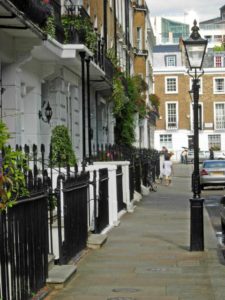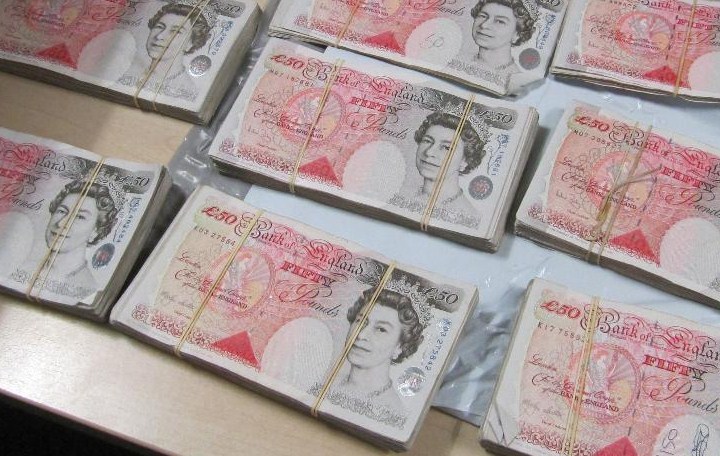08 November 2018
Foreign Purchasers
Dark Buildings, Dirty Money.
By Lynda Goetz
 A friend of mine who is fortunate enough to own a house in Knightsbridge, in an area where the price tag for a two-bedroom flat comes in at over two million pounds, was reflecting rather sadly the other day on how much the area had changed since she was bringing up her children there back in the nineties. “Nowadays” she commented, “you can go out at night and pretty much all the properties are in total darkness”. This is not, as you might imagine, because all the inhabitants are out spending their wealth in the restaurants, concert halls and theatres, which are some of the draws of London, but quite simply because most of the owners do not live in the properties at all. They live abroad; in China, Singapore, Hong Kong, Russia or one of the Arab States. Nor, on the whole, do they let these properties. They may stay in them for a few days a year when they come on a shopping trip or on business, or sometimes allow their offspring to live in them, but on the whole they are simply an investment or a way of cleaning up dirty money.
A friend of mine who is fortunate enough to own a house in Knightsbridge, in an area where the price tag for a two-bedroom flat comes in at over two million pounds, was reflecting rather sadly the other day on how much the area had changed since she was bringing up her children there back in the nineties. “Nowadays” she commented, “you can go out at night and pretty much all the properties are in total darkness”. This is not, as you might imagine, because all the inhabitants are out spending their wealth in the restaurants, concert halls and theatres, which are some of the draws of London, but quite simply because most of the owners do not live in the properties at all. They live abroad; in China, Singapore, Hong Kong, Russia or one of the Arab States. Nor, on the whole, do they let these properties. They may stay in them for a few days a year when they come on a shopping trip or on business, or sometimes allow their offspring to live in them, but on the whole they are simply an investment or a way of cleaning up dirty money.
 This is not a new trend and indeed it is a trend which has slowed in the last year as the market itself has become more sluggish and to some extent as the new stamp duty laws have bitten. However, although the London market may have dropped over the last five quarters, it still remains the most expensive place in the UK to buy a house, with the average house price at £478,000 being double the national average. At the top end, of course, ‘average’ does not really come into it. Here, the super-rich are still ‘snapping up’ London penthouses in the tens of millions, according to a report on the front page of The Sunday Telegraph’s Business and Money section. Apparently, in the words of Edward Lewis of estate agents Savills there are still overseas buyers who see London “as a good long-term play” and penthouses fall into the category of “rare and unique stock” and accordingly sell “more quickly” than the “shiny apartments and lovely terraced houses”. The key words here are of course ‘play’ and ‘stock’. These foreign purchasers do not see their properties as homes in the way most of us do, but as ‘plays’ to increase their already fabulous wealth and ‘stock’ as in the Cambridge Dictionary definition of ‘a supply of something for use or sale’.
This is not a new trend and indeed it is a trend which has slowed in the last year as the market itself has become more sluggish and to some extent as the new stamp duty laws have bitten. However, although the London market may have dropped over the last five quarters, it still remains the most expensive place in the UK to buy a house, with the average house price at £478,000 being double the national average. At the top end, of course, ‘average’ does not really come into it. Here, the super-rich are still ‘snapping up’ London penthouses in the tens of millions, according to a report on the front page of The Sunday Telegraph’s Business and Money section. Apparently, in the words of Edward Lewis of estate agents Savills there are still overseas buyers who see London “as a good long-term play” and penthouses fall into the category of “rare and unique stock” and accordingly sell “more quickly” than the “shiny apartments and lovely terraced houses”. The key words here are of course ‘play’ and ‘stock’. These foreign purchasers do not see their properties as homes in the way most of us do, but as ‘plays’ to increase their already fabulous wealth and ‘stock’ as in the Cambridge Dictionary definition of ‘a supply of something for use or sale’.
For many years in this country, we have not put any limits or restraints on the investment by foreigners in our housing stock nor in any of our key industries, in line with our free trade belief; but the government has begun latterly to modify these freedoms. In the last few months and weeks, several items in the news have highlighted this direction of travel, so to speak.
Firstly, the wife of the former chairman of the International Bank of Azerbaijan, Jahangir Hajiyev, who was jailed in Azerbaijan in 2016 for fraud and embezzlement, became the first person in this country to be subject to an Unexplained Wealth Order (UWO), under legislation introduced earlier this year. In October, his wife Zamira Hajiyeva was revealed as the first person to be subject to two UWOs. She has been ordered by a UK court to explain where the money came from to buy a house for £11.5 million pounds in London and a golf course in Ascot. This week, Mrs Hajiyeva, who is reported to have spent £16 million in Harrods over the course of 10 years, had £400,000 of jewellery confiscated by the National Crime Agency (NCA) when it was sent to Christie’s auction house for valuation. Although she refutes any suggestion that her wealth is the result of fraudulent dealings, it was also reported this week that the Azeri (Azerbaijani) government are seeking an extradition order on the grounds of conspiracy to defraud the International Bank of Azerbaijan.
Whether or not Mrs Hajiyev was aware that the vast sums of money she was spending far exceeded the salary her husband was being paid in his role as chairman of the bank is not really material, although it is of course all rather fascinating in a fantastical sort of way. What is material is that at long last our government appears to have introduced effective legislation to deal with the vast unexplained funds which have found their way into this country and are being laundered through purchase of UK property and assets. Transparency International UK, a registered UK charity and part of the global Transparency International group, has been instrumental in influencing the government towards this legislation since 2014. Last week they also welcomed the government’s new Serious and Organised Crime Strategy, part of which is specifically aimed at targeting those in the private sector who allow illicit wealth to pass through their businesses.
Tthis will undoubtedly affect those such as estate agents and purveyors of luxury goods such as cars who have any reason to question the source of their clients’ funds. Private schools have also been put on notice by the NCA. As an official put it,“Private schools don’t just legitimise your wealth, they also legitimise your children as well”, so that for families with tainted reputations at home they kill two birds with one stone. As the cost of a private school education has risen and is becoming beyond many of the lawyers, doctors and accountants who used to make up a staple part of their clientele, schools are increasingly turning to wealthy Russian and Hong Kong Chinese to fill places. The NCA warns schools not to turn a blind eye to the question of where the money to pay fees is coming from.
The other news item which ties interestingly into this scenario was the rather shocking report which suggests that half the Russians in London are in one way or another connected to spying. The report, prepared by the Henry Jackson Society think-tank and endorsed by the former head of M16, Sir Richard Dearlove, said that half the 150,000 Russians living in London are actively helping Russia’s secret service. The report’s author, Andrew Foxall, considers they are ‘part of a broad and malevolent effort to undermine our society’ and calls for the government to redouble its efforts in combating the threat posed by Russia.
So, if half the Russians in London are spies and the other half are oligarchs laundering their dirty money, what would happen if we asked them all to leave? Clearly, in the interests of international relations this is not going to happen, but would the London property market collapse? Would the rest of the UK market follow? What about the Chinese and their investments? As William Hague says in his comment piece in The Telegraph today, the Government White paper on proposed National Security and Investment Reforms published in July very much had China in mind. The darkening of London buildings may be the very least of our worries as the great-power struggles move into a higher gear. What does seem clear is that the days of ‘laissez faire’ and ‘live and let live’ which we have, to some extent, lived under for a while look as if they are going to be increasingly challenged by legislation of a more nationalistic nature, both here and elsewhere.


